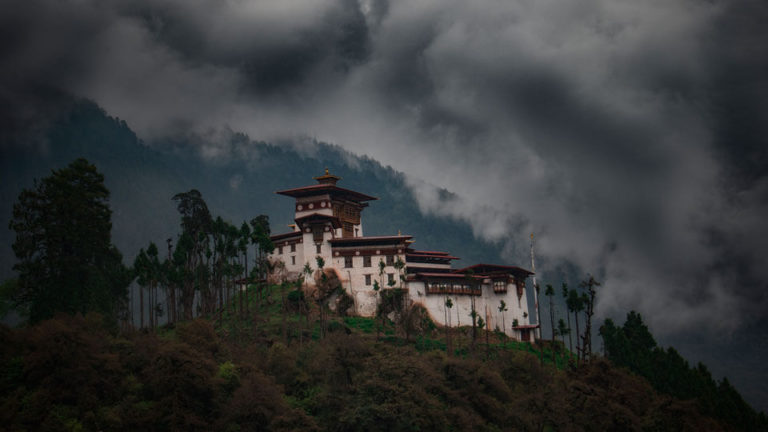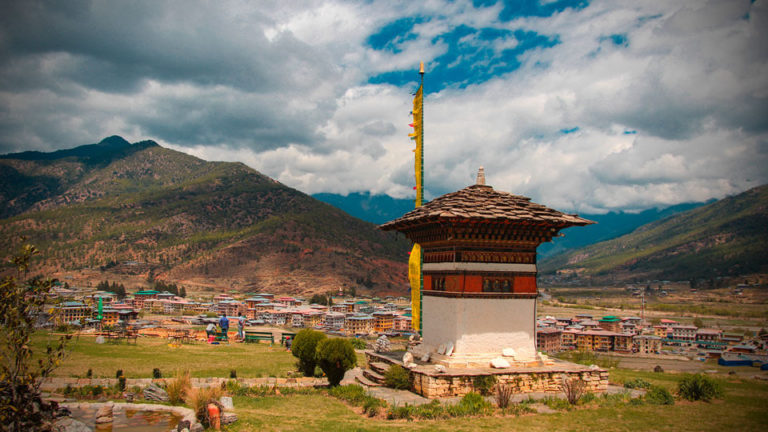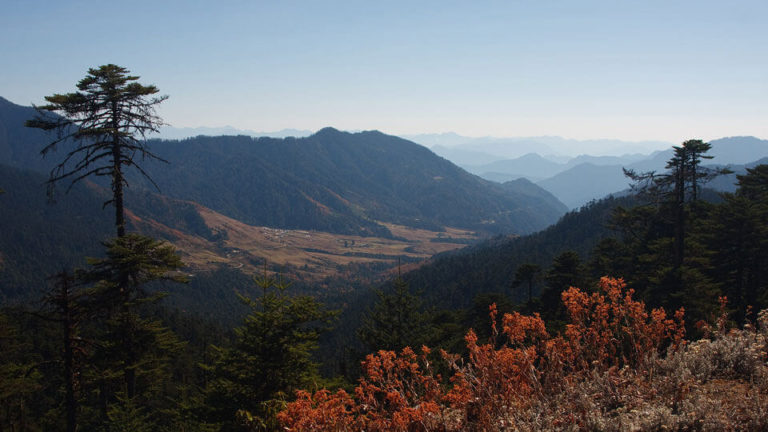How to travel to Bhutan.
PUBLISHED JANUARY 19, 2022 • 8 MIN READ

How to get to Bhutan? In the case of many people, you start by getting out a globe or an atlas and figuring out just where Bhutan is. Here’s a hint: Find India and look at the far northern border of the country. The small country to the north – that’s probably Nepal. Look for the even smaller country to the north, just to the right. There you go. When it cones to its size, Bhutan is just a dot on the map.
Getting into Bhutan
Today, there are two ways for international travelers to enter Bhutan: overland or by air. The three land entry points into Bhutan are along the southern border with India. The only international airport is in Paro, in western Bhutan. A journey overland into and through Bhutan is a fascinating experience. International travelers can enter through three gates: Phuentsholing, the busy town bordering Jaigoan, West Bengal, Gelephu border town with India in south-central Bhutan, and Samdrup Jongkhar, which borders Assam. The entry from Samdrup Jongkhar is particularly good option if you wish to explore the remote eastern Bhutan. Travelers should fly to Guwahati, the capital of Assam from Bangkok or any Indian cities. The drive from Guwahati to Samdrup Jongkhar is about 110 Kms and takes about three hours. Tourists entering Bhutan through Samdrup Jongkhar will take you to Trashigang, and from there over the lateral route to Monggar, Bumthang, Trongsa, Wangdue Phodrang and then finally Thimphu and Paro. A tour overland allows the travelers to stop at all the scenic or curious locales along the way. The road journey from east to west or vice-versa will remain one of your all-time favourite Himalaya experience.
Travel by air is quicker and affords the traveler the incomparable (and, to some, terrifying) descent into Paro. The plane seems to fly awfully close to the mountains and the pilot warns passengers not to be scared – “this is the way we do it,” he assures. Bhutan is served by only two airlines — Drukair and Bhutan Airlines and they (at the time of writing this blog) fly in from Bangkok, Singapore, Kathmandu, Dhaka, Delhi, Kolkata, Bagdogra and Guwahati. Your tour operators can arrange the flights from those cities as a part to trip arrangement. Tickets can also be bought online by yourself from those airlines but it pose difficulty in case if you wish make changes in tickets and in getting refund if cancelled.
Bhutan Visa and Permit
All international tourists must have a visa, which will be procured for you by your tour company. The visa cost is included in the daily tariff of USD200 for travel during the low season (December – February, when it is cold in much of Bhutan, and June – August, when it is monsoon season in much of Bhutan), and USD250 during the high season. The tariff includes most of your travel costs: lodging, meals, tour guides, internal travel, etc. Extra expenses are just that, extra. So, if you want to stay at an ultra-swanky hotel, there will be an extra charge. Likewise, the cost of the beautiful and unique Bhutanese handicrafts you will certainly want to buy in memory of your trip is not covered in the tariff – though the colorful, hand-woven scarf or the lavishly hand-painted thanka will delight you for years to come.
Your tour company will send you a visa clearance letter before you arrive. Show this letter to Bhutanese immigration officials at your point of entry and they will stamp a Bhutan visa into your passport.
Indian and Bangladeshi and Maldivian visitors do not require visas and are exempt from paying the daily tariff charges. Visitors from India, Bangladesh and Maldives may travel to Bhutan with either a passport or a voter ID card. Present either of these documents along with two passport-sized photos at your entry point to receive an entry permit. For travel to restricted areas within Bhutan, even these visitors need route permits and this will be arranged by your operator.

When to come to Bhutan
The weather is best in Spring and Autumn and some of the popular festivals also take place during those seasons. Spring will see flowers sprouting back to life and Autumn and will have clear skies for mountain views. If you are looking forward to travel during warm weather with maximum greenery around, Summer (June, July and August) is the right season. Winter cannot be avoided. Mornings and evenings can turn chilly but days will be full of sunshine with visibility still good. It is during Winter that the endangered black-necked cranes migrate to Phobjikha Valley from Tibetan plateau. Another highlight of this season is Dochula Druk Wangyel Festival, the national event only of its kind in the country.
Selection of accommodation
Bhutan has choices for accommodation from simple traditional farmhouses to posh five-star luxury hotels. If the purpose of your visit is not luxury but to experience authentic Bhutanese essence, the mid-range 3 star Bhutanese type hotels are recommend. The government set tariff covers the 3 star hotels and luxury hotels come with additional cost over and above set tariff. Of late, homestay has gained some momentum in Bhutan and this is good for the visitors as well as locals. How? — visitors get to experience the real traditional village life and locals earn from it. Family-run eco lodges and heritage hotels converted from traditional old houses are also on the list for you to select.

Selection of tour company
Nothing is more important than selection of your ground operators. It is with good tour operators that all ‘goods’ come along — good guide, good car, good hotels and good service. And those ‘goods’ combined makes a best trip. If you have time, it is good to shop around by contacting few operators but price alone should not be the determining factor in choosing your operator. Although tour tariff is set by the government and tour operators are required to provide the set tariff, there can be some desperate operators quoting below government set tariff. This is not within the norms and if known by government, your visa will be revoked.
Payments to your ground operator
Bhutan government sanctions visa only upon receipt of full tour payment in advance. Your money will be held by the government and it will be released to the operators upon completion of the trip. So there is nothing to panic when your operator ask you to pay full in advance. This is normal.
Share this:
Copyright © Bhutan Travel Guru - All Rights Reserved.
